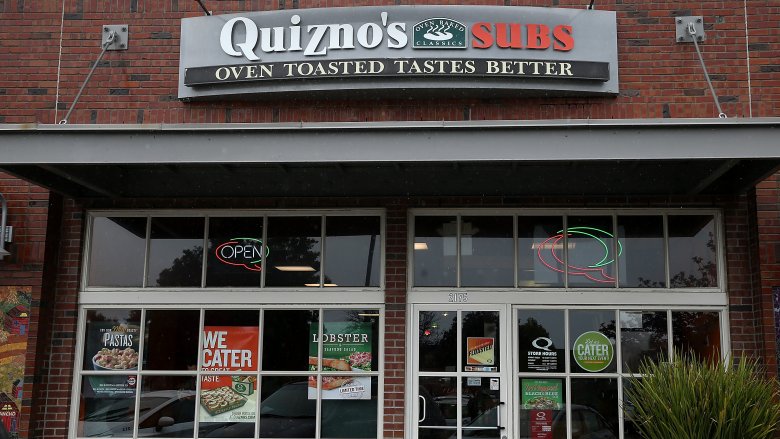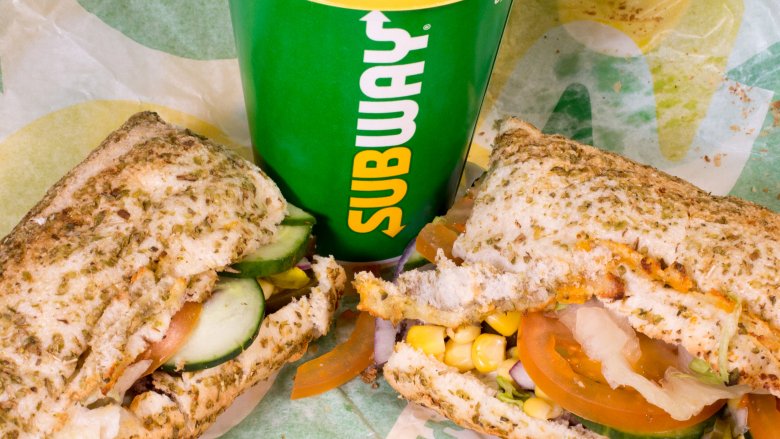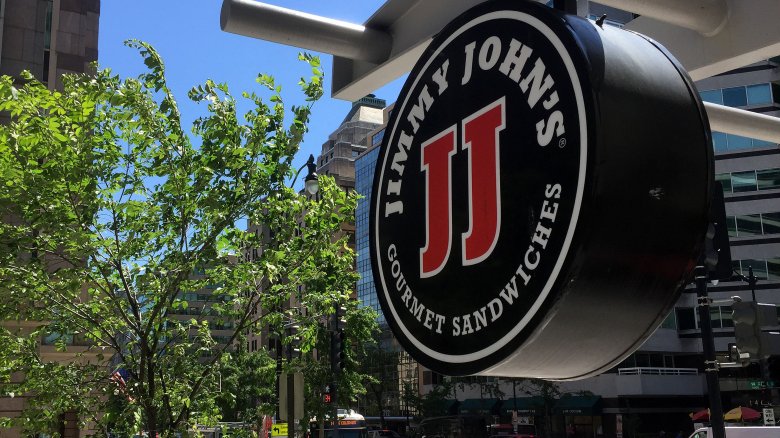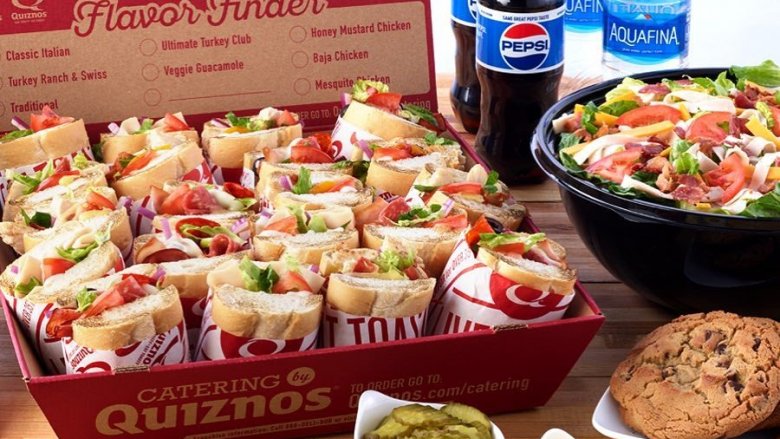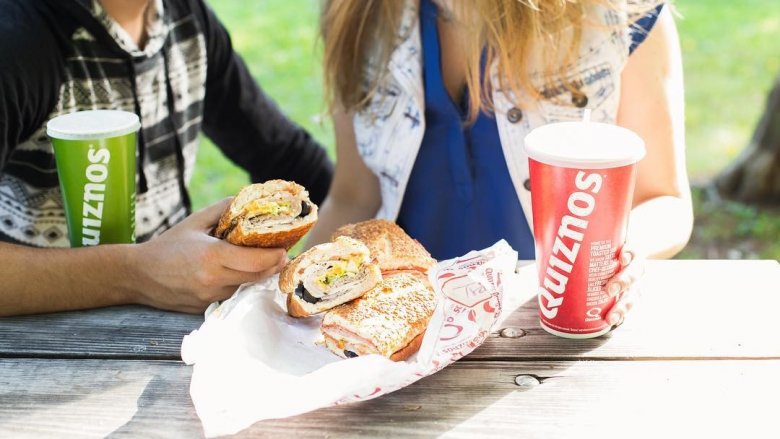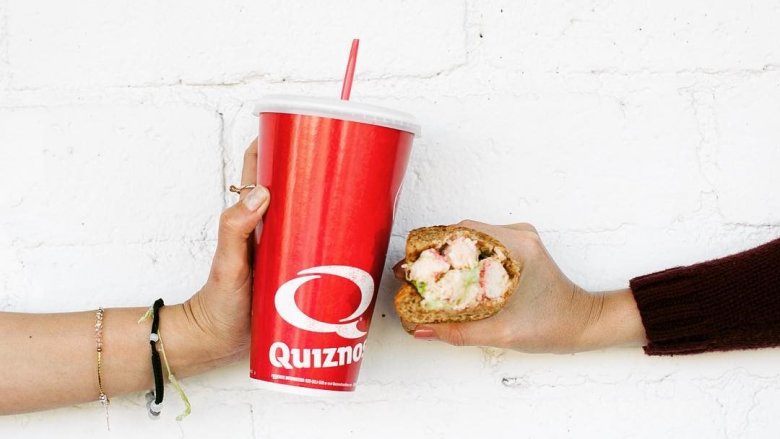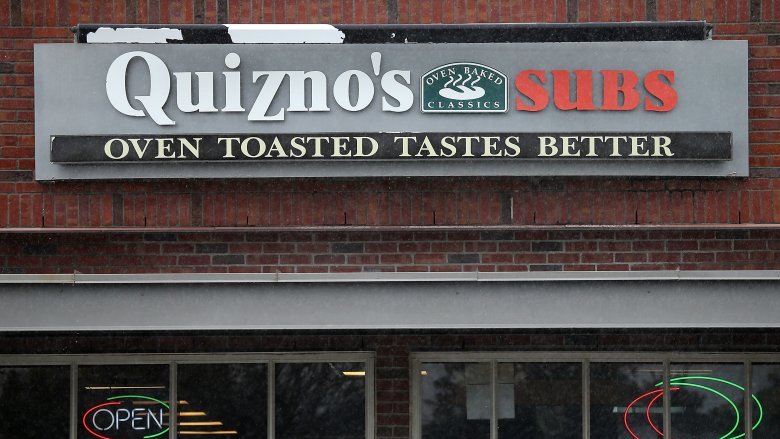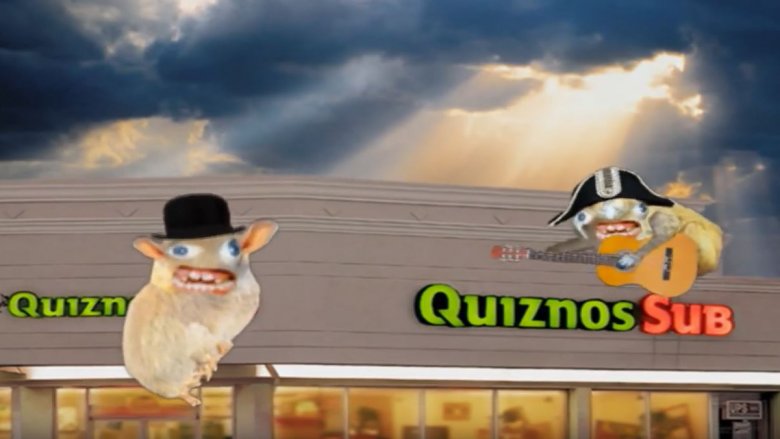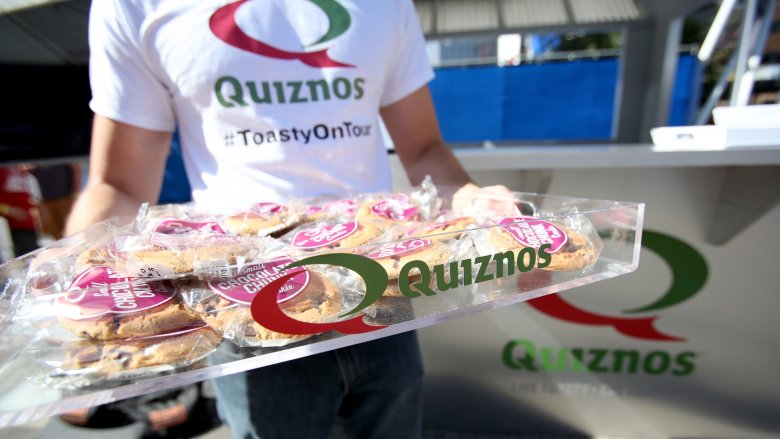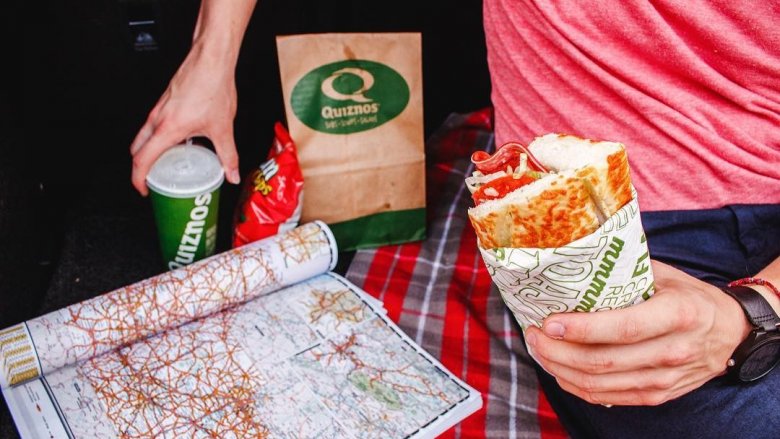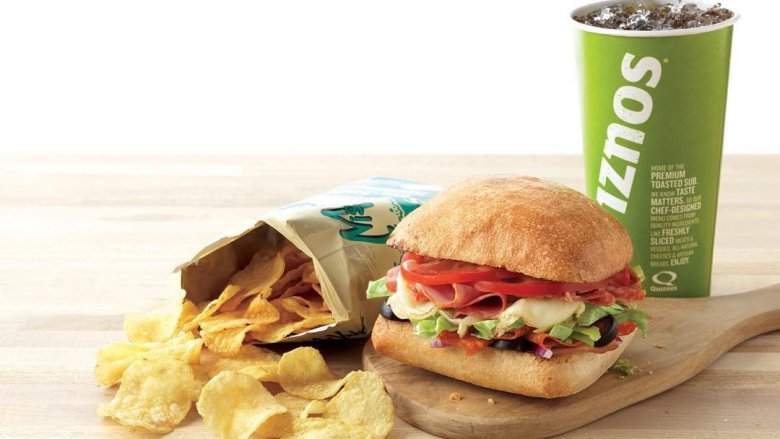The Real Reason Why Quiznos Is Disappearing Across The Country
It wasn't long ago that Quiznos was a pretty big deal. They were a little more upscale than Subway, and those toasted rolls were an absolute win no matter what was on them. But it turns out that toasting rolls isn't enough to keep them on the top of the food chain when it comes to fast food sub shops.
If you can't remember the last time you saw one, it's not your imagination. According to Restaurant Business, the 4,700 locations they had in 2007 had shrunk to less than 400 in a decade. That's a huge loss — about 90 percent of their stores — so how does that much loss even happen?
It's complicated, and it involves angry franchisees, a bizarre business plan, and record-setting lawsuits. Quiznos didn't just get outdone by their competition, they made some catastrophic business decisions that make part of their huge downfall one of the strangest stories of restaurant failure in the country. There are some lessons to be learned here, and whether they learned quickly enough to save their business, time will tell.
People preferred cheap over toasted
Quiznos saw a steady decline between 2007 and 2017, and in 2014 CNN reported they were filing for bankruptcy. Stores were supposed to remain open during a massive restructuring, and at the time, there were around 2,100 of them. Only seven were owned by corporate, who issued a statement saying they were going to take a long, hard look at their operating procedure.
At the same time, Subway announced they were expanding. According to The Huffington Post, a huge part of Subway's success — which came at the expense of Quiznos — was their price point. While Subway was offering affordable, Quiznos was offering fancy (or, at least, fancier), and for Americans suffering through economic difficulties, cheap was the way to go. Quiznos' higher-end concept meant prettier stores, higher overhead, and a higher price passed on to the customer. Why pay more when you can pick up a $5 footlong?
New kids on the block
Subway and Quiznos have always been competing for a piece of the sandwich market, but Quiznos's problem escalated with the appearance of other higher-end sub shops to take away the customers that still did want something a little fancy. When chains like Potbelly and Jimmy John's started expanding, they didn't just take business away from Quiznos — they forced Quiznos to make some tough decisions that put a big hurt on their bottom line.
In order to try to stay competitive and keep customers, Quiznos decided to try to wage war on other chains' lower prices, while still keeping their expensive ingredients. Market analyst IBISWorld says this put some extreme pressure on their profits, and this cost squeeze hurt so many locations that it was linked to the closures of around 2,500 stores.
Meanwhile, at a time when more and more people were trying to support smaller, local businesses, newcomers like Firehouse Subs were using their specialized regionality to lure customers away from the national chains. Together, competition from the big guy — Subway — and the little guys handed Quiznos a serious double whammy.
High supplier costs
Quiznos franchisees are particularly hard hit by competition and anything that cuts into profits, because the chain has a bizarre business plan. While most fast food franchises negotiate with vendors who then supply locations directly (at a reduced cost, since they're buying in bulk), Quiznos corporate buys all supplies — from food to paper supplies to CDs — from vendors, then turns around and sells them to franchisees.
Entrepreneur says that's a big deal, and it means a Quiznos location needs to sell a lot more than a comparable Subway before they even break even. While most restaurants ideally operate with a food cost of 30 percent, Quiznos forces their franchisees to start with a cost of up to 39 percent.
That's crippling to a business, and it's a business model franchisees have been laboring under for years. Quiznos was founded in 1981, and grew to 18 locations before the whole company was sold to one of their franchisees, Rick Schaden. Forbes says he's the one that came up with the bizarre business plan, and it ended up breaking the franchise owners they should have been helping.
The biggest lawsuit of all
Quiznos restrictive business practices didn't go unnoticed, and in 2006, around 10,000 franchise owners took corporate to court with a class action lawsuit. According to Forbes, they claimed corporate was essentially making them what's termed "captive customers" and forcing them to buy supplies at grossly inflated prices that made it nearly impossible for them to be successful.
Schaden denied any wrongdoing, saying that Quiznos was simply passing market costs on to their franchisees. They were still forced to settle the lawsuit, and ended up paying out a whopping $206 million to their franchisees. In 2015, Quiznos board chairman, Doug Benham, called past lawsuits "...directly on point to that subject."
And a $206 million settlement was just the start. Other franchisees sued separately, and at the same time Quiznos was fighting on that front, 6,900 franchisees in Colorado, Illinois, and Wisconsin filed a similar suit. They won $95 million, with a huge chunk of that going to franchisees who paid their fees but were never allowed to even open a restaurant, because of ongoing location disputes (via Cleveland).
Their franchisees still don't like them
Even after Quiznos paid out more than $300 million, the relationship between corporate and franchisee was far from mended. In 2013, The Denver Post was reporting on another set of lawsuits, which basically stated Quiznos was still overcharging franchisees for the products they were forced to buy through corporate.
There was another part to these lawsuits, too. Individual stores were claiming corporate was now forcing them to participate in promotions and other sales, while not reimbursing them for the money they were losing in the process. Quiznos denied any wrongdoing, and in November both the franchisee leading the suit and Quiznos reached a settlement that didn't end with anyone handing over any cash. Franchise Times says their attempts at getting more information just ended with everyone declining to make a statement, but the rest of the owners weren't done yet.
The next spring, The Denver Post was reporting the 12 remaining franchisees had refused the settlement and continued the fight. Quiznos didn't earn themselves any good will when they countersued the defunct franchisees for breach of contract, and the whole mess ended with an undisclosed settlement.
They were blamed for the suicide of a franchisee
Amid all the lawsuits, the story of one franchise owner brought the conflict between owners and corporate into sharp focus. Bhupinder Baber owned two locations in Long Beach, and when another franchisee opened nearby, his sales plummeted. Getting no response from the corporate offices who had promised him no one would be opening nearby, he organized the Quiznos Franchisee Association in hopes of helping other owners fight against what they deemed unfair business practices.
That was in 2004, and according to the Long Beach Post, that was when Quiznos ended Baber's franchisee agreement. By 2005, Baber was slated to go to Denver to argue his claims. Fearing the trip was going to cost him too much and he would lose what little he had left, he walked into a Quiznos bathroom and killed himself.
He left behind a note calling for an investigation into Quiznos and their business practices, and that note was released to the public. The Post says the nightmarish tangle of lawsuits Quiznos and their franchisees were embroiled in for years has roots in both Baber's franchisee organization and in what happened in that California Quiznos, and that's the sort of thing no one can ignore.
If you or anyone you know is having suicidal thoughts, please call the National Suicide Prevention Lifeline at 1-800-273-TALK (8255).
They had too many creepy campaigns
Some advertising campaigns are timeless wins, and others... not so much. Business Insider called the creepy spongemonkeys from Quiznos one of The 10 Worst Ad Campaigns Of All Time, and customers agreed.
The spongmonkeys were all over Quiznos advertising from February 2004 until August of the same year, says Adage, and if it feels like you were tortured by them for a lot longer than that, you're not alone. They were so maligned that some franchisees took to posting signage apologizing for them, and saying they had nothing to do with the weird, weird idea. In the first week, Quiznos' Denver headquarters got in the neighborhood of 30,000 phone calls from people wondering what the heck was going on, and when it came time to give them the ax, corporate said they'd done what they were supposed to: create buzz. Unfortunately, it wasn't all good buzz.
Entrepreneur says Quiznos marketing has been far from successful. The spongmonkeys were creepy and turned customers off, and in 2009 their attempts at making a sexually aggressive toaster oven hilarious once again fell short, and did more harm than good.
Bad publicity from a sex scandal
Sometimes, a sex scandal makes headlines for a bit and people move on. Other times, it does some serious damage — and that's definitely the case when it involves one of a company's senior executives, and a 13-year-old girl.
In 2006, Quiznos' senior VP of marketing was arrested after striking up a conversation with an online persona he thought was a 13-year-old girl. It was actually a member of the Canon City, Colorado police department, and after a series of lewd conversations, they arranged to meet up. It didn't go as he planned: Scott Lippitt was arrested on five felony charges, including internet luring, internet sexual exploitation of a child, and criminal attempt at sexual assault on a child.
According to Adage, Lippitt was released on $250,000 bond, and wasn't fired from Quiznos at first — instead, he was put on an indefinite leave of absence. Soon after, Lippitt was fired, though his attorney claimed it was only because of the bad publicity. As if that wasn't enough to tarnish Quiznos' image even further, it also came out that he had been behind both the spongemonkeys ad campaign and an even more uncomfortable one that featured Baby Bob, an infant with an adult voice who hit on women. Yikes.
The free sub fiasco
Free food is great, but do you know what's not great? When companies are seen as not honoring their own coupons and free food promises.
In 2009, Quiznos tried to get some serious goodwill with free sandwiches. They offered up the no-strings-attached deal with hopes of getting people in their doors again, but it wasn't long before Consumerist was reporting that customers were getting denied their subs. Some locations didn't honor the coupons at all, others only accepted them if customers bought something else, and needless to say, people were not happy.
Consumerist did some more digging, and found that franchisees had a very good reason for not accepting the coupons: they weren't being compensated by corporate, and instead were expected to eat the cost of the "free" subs. A few days after the promotion started, an internal memo suggested they were going to start helping franchisees with the costs of the promotion, and at the time, they said they'd "had nearly 200,000 coupons printed the first day," and that's a ton of subs that could cripple already struggling franchises. Quiznos promised to make it right, but that's not the kind of thing people forget.
Restructuring and buyouts have failed
In the face of lawsuits, conflict, and all kinds of bad publicity, Quiznos has struggled on. In 2016, the company was handed over to a new CEO, former CMO Susan Lintonsmith (via BizJournals). She made some significant strides toward relieving pressure on the franchisees they had left, cutting the payments they were required to make to corporate and kick-starting a new loyalty program. But too little, too late?
Quiznos was bought in June 2018 by a private investment firm (via Nation's Restaurant News), and even though they weren't suffering as badly as they had been in previous years, they had still closed 100 stores in 2017. That might not sound like much in the grand scheme of things, but remember — by this point, that was a quarter of their stores.
Restaurant Business blames Quiznos' fall on a combination of competition, a bad business plan, bad decisions, a nationwide recession, buyouts, bankruptcy, and bad press. That's a lot for any chain to recover from, and Quiznos' fate is still very much up in the air — especially when other sub chains are only expanding.
